Viscount of Faria e Maia (Portuguese : Visconde de Faria e Maia) was a noble title, created by decree on 16 April 1891, by King Carlos I of Portugal, in favour of Francisco Machado de Faria e Maia, an important landowner and Azorean politician.
Viscount of Faria e Maia (Portuguese : Visconde de Faria e Maia) was a noble title, created by decree on 16 April 1891, by King Carlos I of Portugal, in favour of Francisco Machado de Faria e Maia, an important landowner and Azorean politician.
After the implementation of the first Portuguese Republic, and fall of the monarchy, the noble titles were extinct, resulting in the transformation of these peerages to the status of pretenders (with the most recent titleholder Vicente Machado de Faria e Maia).
The Ponta Delgada Football Association is the governing body for association football and futsal competitions in the Portuguese former-district of Ponta Delgada. This organization regulates football in the Azorean islands of São Miguel and Santa Maria.
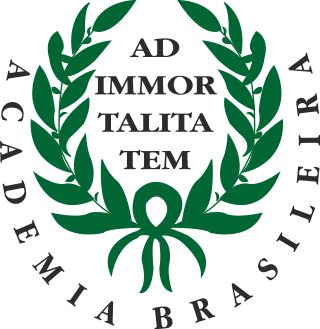
The Academia Brasileira de Letras is a Brazilian literary non-profit society established at the end of the 19th century. The first president, Machado de Assis, declared its foundation on Tuesday, 15 December 1896, with the by-laws being passed on Thursday, 28 January 1897. On Tuesday, 20 July of the same year, the academy started its operation.
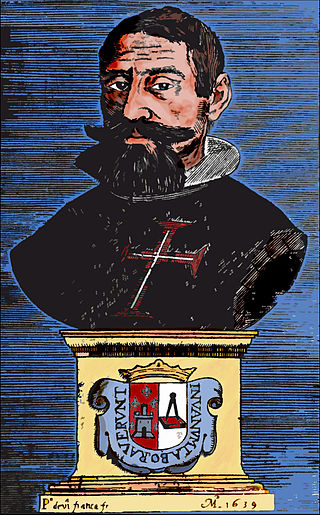
Manuel de Faria e Sousa was a Portuguese historian and poet who frequently wrote in Spanish.
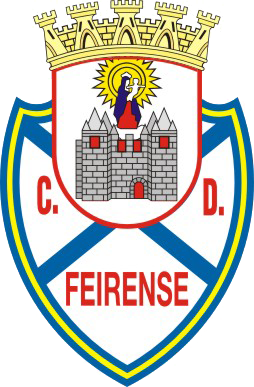
Clube Desportivo Feirense, commonly known as CD Feirense or just Feirense, is a Portuguese football club based in Santa Maria da Feira. Founded on 18 March 1918, Feirense play in the LigaPro, the second tier of Portuguese football. Their chairman is Kunle Soname and their manager is Filipe Martins. The club plays its home matches at the Estádio Marcolino de Castro, with a capacity of 5,500 spectators.

The "Hymn of the Azores" is the official regional anthem used during some ceremonies in the Portuguese autonomous region of the Azores. For official purposes, the national anthem, "A Portuguesa", is always used during government events, in sporting venues, and during other civic ceremonies.
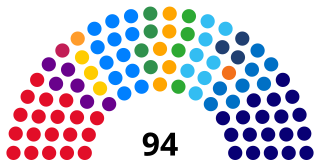
The Legislative Assembly of the State of São Paulo is the unicameral legislative branch of São Paulo state in Brazil. The building where the legislative assembly is located, right by the main park of the city, also houses one of six Poupatempo units in the city.
Marshal is the highest rank in both the Brazilian Army and the Brazilian Air Force, although the latter is titled marechal-do-ar. These ranks are equivalent to that of grand admiral in the Brazilian Navy. A marshal is distinguished by using five stars, which for a marshal of the air are in the approximate position of Southern Cross and for a marshal in the army, in the form of "X". The five stars of admiral are in the shape of a pentagon.

The Brazilian nobility refers to the titled aristocrats and fidalgo people and families recognized by the Kingdom of Brazil and later, by the Empire of Brazil, dating back to the early 19th century, when Brazil ceased to be a colony of the Kingdom of Portugal. It held official status until 1889, when a military coup d'état overthrew the monarchy and established the First Brazilian Republic.
The Palace and Gardens of Panaca, sometimes characterized as the Palácio Palha is a palace within the Santa Engrácia area of the civil parish of São Vicente, in the municipality in the Portuguese capital of Lisbon.

Events in the year 1891 in Brazil.
Events in the year 1899 in Portugal.
The Viscount of Paço de Nespereira is a Portuguese title bestowed by King Luís I of Portugal in 1886 to a member of the Lobo Machado family, Gaspar de Sousa Lobo Machado, 9th Lord of Santão, even though the lordship of Paço de Nespereira was traditionally of held in the hands of the Amaral-Cardoso-de-Menezes clan.
Following the final collapse of the Mughal Dynasty in 1857 and the proclamation of the British Indian Empire, the British continued to maintain and recognise many of the old Mughal and Hindu styles and titles, introducing a compound honours system which awarded those titles along with British noble and aristocratic titles and knighthoods. Uniquely, the Indian subcontinent was the only part of the British dominion where British hereditary titles were conferred upon British subjects not of European ancestry. All British titles and honours became obsolete after the formation of the modern Republic of India in 1950, though they continue to be recognised by the British government. The Portuguese gave titles and created coats of arms for its Goan citizens from the early 1700s, both Hindu and Indian Christian. These titles however lost their recognition after the Portuguese Revolution and start of the First Portuguese Republic in 1910.
José António de Melo da Silva César e Meneses, the 8th Count of São Lourenço, 2nd Count of Sabugosa, alcaide-mor of Elvas, ensign-chief of Portugal, gentleman of Royal Household, holder of the Grand-Cross in the Order of Christ and Commander in the Order of the Tower and Sword, was a high noble and general in the Portuguese Army, who between 1804 and 1806 was the 4th Captain General of the Azores.
Pecado Capital is a Brazilian telenovela produced and broadcast by TV Globo. It premiered on 24 November 1975 and ended on 4 June 1976, with a total of 167 episodes. It's the sixteenth "novela das oito" to be aired on the timeslot. It is created and written by Janete Clair and directed by Daniel Filho and Jardel Mello.
Espelho Mágico is a Brazilian telenovela produced and broadcast by Rede Globo. It premiered on 14 June 1977 and ended on 5 December 1977, with a total of 150 episodes. It's the nineteenth "novela das oito" to be aired on the timeslot. It is created and written by Lauro César Muniz and directed by Daniel Filho, Gonzaga Blota and Marco Aurélio Bagno.
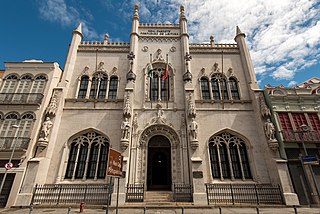
The Royal Portuguese Cabinet of Reading is a library and lusophone cultural institution, is located in Luís de Camões Street, number 30, in the center of the city of Rio de Janeiro, Brazil. It is listed by the State Institute of Cultural Heritage. Elected the fourth most beautiful library in the world by Time magazine, the Cabinet has the largest collection of Portuguese literature outside Portugal.